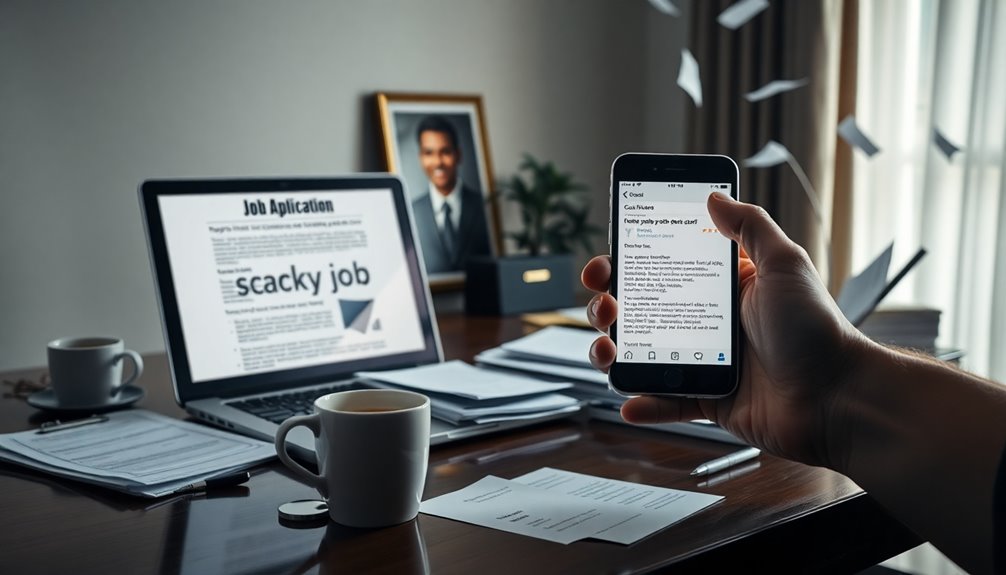To access success in peer interviews, you should focus on team fit rather than just qualifications. Assess your interpersonal skills and communication; they're crucial for aligning with company culture. Show your collaborative spirit and highlight your ability to contribute positively. When conflicts arise, address them directly and encourage open dialogue, fostering trust among coworkers. Empathy, reliability, and strong communication are essential traits to demonstrate. Make sure you're dependable and willing to support your teammates. By understanding these key insights, you'll pave the way for effective teamwork and contributions—there's even more to discover about thriving in a peer interview.
Key Takeaways
- Focus on team fit by assessing interpersonal skills and alignment with company culture during peer interviews.
- Evaluate candidates' communication abilities to ensure clarity and collaboration within the team.
- Look for empathy and optimism, as these traits contribute to a supportive and positive work environment.
- Encourage active listening and dependability to foster trust and reliability among team members.
- Promote open-mindedness in discussions to enhance collaborative problem-solving and improve team dynamics.
Understanding Peer Interviews

Peer interviews play an essential role in the hiring process, focusing on the candidates' fit within the team rather than just their qualifications.
During these interviews, you'll engage with potential coworkers who assess your interpersonal skills and team compatibility. They'll ask questions that reveal how well you align with the company culture and the dynamics of the existing team.
You'll want to showcase your collaborative spirit and ability to communicate effectively. Remember, it's not just about your technical skills; it's about how you'll contribute to a positive work environment. Additionally, maintaining emotional alignment during these interactions can significantly enhance your chances of creating a lasting impression.
Key Conflict Resolution Strategies

In managing workplace conflicts, it's crucial to approach issues directly and privately with those involved. Start by acknowledging your role in the situation, as this fosters accountability and openness.
Encourage your coworkers to share their perspectives, which can reveal underlying concerns and promote understanding. Focus on collaboration by brainstorming solutions together, emphasizing that the goal is a harmonious work environment.
After resolving the conflict, discuss strategies to prevent similar issues in the future, reinforcing a proactive approach. Always maintain clear communication throughout the process, as it builds trust and shows commitment to teamwork. Additionally, consider implementing conflict management techniques that prioritize open communication, as this can enhance relationships and create a more cohesive team environment.
Desired Coworker Traits

Creating a positive work environment goes beyond resolving conflicts; it also involves understanding the traits that make a great coworker.
You'll want to look for empathy, as it fosters a supportive atmosphere where everyone feels valued. Strong communication is essential, too, ensuring clarity and understanding among team members.
Optimism can greatly influence workplace morale, encouraging a culture of positivity. Reliability builds trust, making it easier for the team to depend on one another.
Finally, open-mindedness is vital for collaborative problem-solving, allowing diverse ideas to flourish. The ability to show genuine kindness in the workplace can enhance relationships and contribute to a more harmonious team dynamic.
Evaluating Teamwork Capabilities

Evaluating your teamwork capabilities is essential for ensuring effective collaboration within a team. Start by examining your active listening skills; are you fully present when others speak?
Dependability is another key trait; can your teammates count on you to deliver your part? Consider your willingness to support others—do you step up when someone needs help?
Strong verbal communication fosters clear understanding, so think about how you express your ideas. Finally, reflect on areas for improvement; recognizing your weaknesses can lead to growth. Embracing self-care practices can enhance your overall well-being, enabling you to contribute more effectively to your team.
Collaborating effectively with your peers not only enhances project outcomes but also builds a positive team culture. By evaluating these aspects, you can better position yourself as a valuable team member.
Defining Team Roles

Sure! Here is the revised content following your directions:
—
Clearly defining team roles is essential for fostering collaboration and guaranteeing that everyone knows their responsibilities.
When roles are clear, you can focus on your strengths and contribute effectively to the team.
Here are four key aspects to contemplate:
- Identify Strengths: Recognize each member's unique skills to leverage them effectively.
- Establish Responsibilities: Clarify what each person is accountable for to avoid overlap and confusion.
- Encourage Collaboration: Foster an environment where team members support each other's roles.
- Set Goals Together: Align everyone's objectives to guarantee a unified direction and purpose. Additionally, effective networking can enhance team dynamics and open doors to new opportunities.
Effective Communication Practices

Effective communication practices are essential for fostering strong relationships within a team and guaranteeing that everyone is on the same page.
To achieve this, make active listening a priority; it ensures all voices are heard and valued. Clarifying points during discussions helps prevent misunderstandings, so don't hesitate to ask questions.
Regular feedback promotes continuous improvement, allowing team members to grow together. Pay attention to non-verbal cues, as they often convey more than words.
Finally, transparency builds trust and encourages open dialogue, making it easier to address concerns and celebrate successes as a group. Additionally, incorporating puppy training classes can enhance team dynamics by providing opportunities for collaboration and shared experiences outside the workplace.
Supporting Coworkers in Need

In a thriving workplace, supporting coworkers in need is essential for building a collaborative environment.
When you prioritize your colleagues' well-being, you create a stronger team dynamic.
Here are four effective ways to lend a hand:
- Offer a Listening Ear: Sometimes, just being there to listen can make a big difference.
- Share Resources: If you have tools or tips that can help, don't hesitate to share them.
- Check-In Regularly: A simple "How are you doing?" can show that you care.
- Encourage Team Collaboration: Foster an atmosphere where everyone feels comfortable seeking help.
Navigating Workplace Changes

Supporting coworkers creates a foundation of trust that's essential when steering workplace changes.
Embrace adaptability; it's critical in dynamic environments. When leadership shifts occur, build relationships with new management to guarantee a smoother shift.
Open communication is fundamental—keep discussions transparent to ease any concerns among your team. Encourage an optimistic view of change; this fosters resilience and promotes personal and collective growth.
Share your experiences and insights, as they can help others feel more comfortable handling uncertainty.
Finally, remind your peers that change can lead to exciting opportunities, so focus on the positive aspects. Together, you'll create a supportive atmosphere that enhances your team's ability to thrive amid change. Additionally, fostering a sense of community can significantly reduce feelings of isolation in dementia patients, making transitions smoother for everyone involved.
Frequently Asked Questions
How Can I Prepare for a Peer Interview?
To prepare for a peer interview, start by researching the company culture and values.
Understand the role's responsibilities and think of examples that showcase your teamwork and conflict resolution skills.
Practice active listening and clear communication, as these are essential.
Also, be ready to discuss how you can support your future coworkers and contribute positively to the team.
Finally, approach the interview with an open mind and a collaborative spirit.
What Should I Wear to a Peer Interview?
Did you know that 55% of first impressions come from your appearance? For a peer interview, you'll want to dress professionally yet comfortably.
Aim for business casual attire—think collared shirts or blouses paired with slacks or skirts. Avoid overly casual pieces like jeans or sneakers.
Make certain your clothes are clean and neat, as this reflects your respect for the opportunity and your potential coworkers. Confidence shines through when you feel good in what you wear!
How Long Do Peer Interviews Typically Last?
Peer interviews typically last between 30 to 60 minutes.
During this time, you'll engage in discussions about your experiences and how well you fit within the team.
It's important to be prepared to answer questions about your teamwork skills and approach to challenges.
Keep the conversation flowing by asking your own questions, showing your interest in the team dynamics and culture.
This not only helps you assess the role but also demonstrates your engagement.
Who Usually Conducts Peer Interviews?
Peer interviews can seem informal yet hold significant weight in the hiring process.
Typically, your potential coworkers conduct these interviews, not hiring managers. They focus on evaluating your cultural fit and teamwork abilities.
While hiring managers assess qualifications, peers gauge how well you'll mesh with the team. Their insights can shape the final decision, making it essential for you to demonstrate your interpersonal skills and collaborative spirit.
What Types of Questions Should I Expect?
In a peer interview, you can expect questions that focus on teamwork and cultural fit.
They might ask how you handle conflicts with coworkers or describe your ideal traits in a teammate. Be prepared to discuss your problem-solving approaches and how you support others in need.
Interviewers may also inquire about your communication style and adaptability to change.
These questions aim to assess your compatibility with the team and workplace dynamics.
Conclusion
In the vibrant tapestry of teamwork, peer interviews are the threads that weave your future together with potential colleagues. By showcasing your conflict resolution skills, desired traits, and effective communication, you not only paint a picture of your ideal self but also illuminate your role within the team. As you step into these interviews, remember: each interaction is a brushstroke that can transform your professional canvas into a masterpiece of collaboration and success. Embrace the process, and shine!
Eugene brings a fresh, dynamic voice to our platform as one of our talented Writers. Specializing in research-driven content, he explores the latest findings in psychology and personal growth, translating them into actionable insights for our readers. Eugene’s work is fueled by a curiosity about what makes us tick and a desire to help others unlock their potential.










